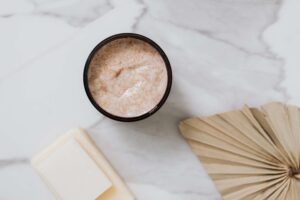Next-Level Exfoliation

When it comes to achieving smooth, glowing skin, exfoliation is key. While facial exfoliation is well-known, the concept of body acids for exfoliating and renewing the skin is gaining popularity. Body acids are a class of chemical exfoliants that offer a gentle yet effective way to shed dead skin cells, revealing a fresh and radiant complexion. In this blog post, we’ll delve into the world of body acids, exploring their benefits, types, and how to incorporate them into your skincare routine for skin that feels revitalized and renewed.
1. The Role of Exfoliation in Skincare
Exfoliation is the process of removing dead skin cells from the surface of the skin. This essential step helps to unclog pores, smooth texture, and promote cell turnover, allowing healthier skin to emerge. Regular exfoliation not only enhances the effectiveness of your skincare products but also supports a more even skin tone and improved skin texture.
2. Understanding Body Acids
Body acids are a category of chemical exfoliants that work by dissolving the bonds between dead skin cells, aiding in their removal. Unlike physical exfoliants that involve scrubbing, body acids offer a more gentle and uniform exfoliation process. They penetrate deeper into the skin, making them effective for addressing various skin concerns, including dryness, rough texture, and uneven skin tone.
3. Types of Body Acids
a. Glycolic Acid: Derived from sugarcane, glycolic acid is one of the most popular alpha hydroxy acids (AHAs) used in body care. It effectively exfoliates the skin, promoting a smoother and more even complexion. Glycolic acid is suitable for most skin types but may be best for those with normal to oily skin.
b. Lactic Acid: Another AHA, lactic acid, is derived from milk. It has larger molecules than glycolic acid, making it a gentler option for sensitive or dry skin. Lactic acid helps improve skin hydration and texture, making it ideal for those seeking mild exfoliation.
c. Salicylic Acid: As a beta hydroxy acid (BHA), salicylic acid is oil-soluble, making it highly effective for penetrating and unclogging pores. It is particularly beneficial for acne-prone or congested skin, as it helps reduce blemishes and inflammation.
d. Mandelic Acid: A milder AHA derived from almonds, mandelic acid offers exfoliation benefits without causing significant irritation. It’s suitable for all skin types, including sensitive skin, and is effective in improving skin tone and texture.
4. Incorporating Body Acids into Your Routine
a. Patch Test: Before incorporating any new skincare product, including body acids, conduct a patch test to check for potential sensitivity or allergic reactions.
b. Start Slowly: If you’re new to body acids, begin with a lower concentration and gradually increase the frequency or strength as your skin adjusts.
c. Cleanse: Begin your body acid routine with a thorough cleanse. Use a gentle cleanser to remove any impurities from the skin, allowing the body acid to work more effectively.
d. Apply Body Acid Product: After cleansing, apply the body acid product to the desired areas, such as arms, legs, or rough patches. Follow the instructions on the product label for the appropriate amount and application method.
e. Moisturize: Follow up with a nourishing body moisturizer to soothe and hydrate your exfoliated skin. This step helps to maintain skin barrier integrity and prevent dryness.

Conclusion
Body acids offer an effective and efficient way to exfoliate and renew your skin. As an essential part of your skincare routine, incorporating body acids can help you achieve smoother, brighter, and healthier-looking skin. Whether you choose glycolic, lactic, salicylic, or mandelic acid, remember to follow proper application techniques and introduce them gradually into your routine. Embrace the power of body acids for a renewed complexion and indulge in the transformative experience of radiant and revitalized skin.




